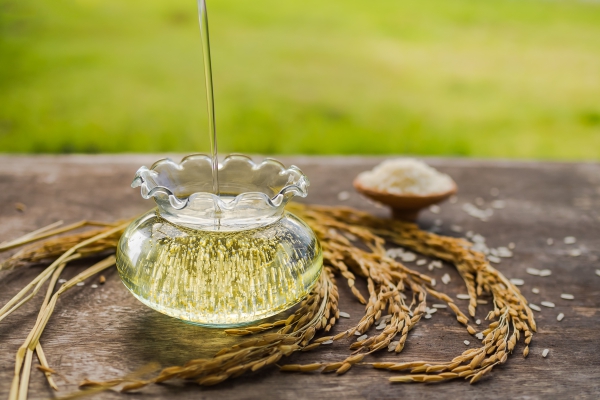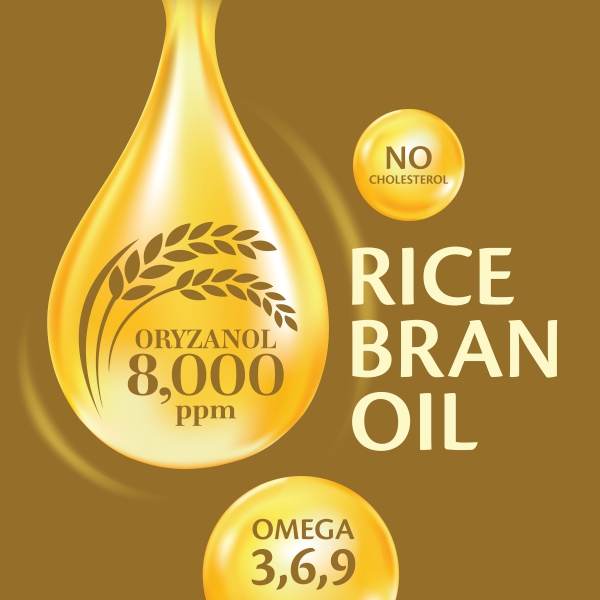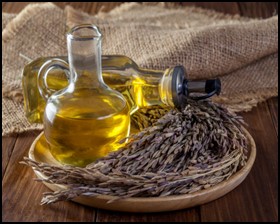Rice bran oil is one of the most important and healthy oils extracted from the outer layer (also known as bran) of rice (both brown and white rice). It is widely used as cooking oil and versatile in different cooking processes. It is well known for its fat composition and considered as heart friendly oil. Especially the antioxidant contents of rice bran oil make it healthier. Recently this oil is achieving enormous popularity due to its potent health benefits and nutritive value.
Nutritional overview
- We all know that rice is an excellent source of carbohydrates but interestingly rice bran oil which is derived from rice bran does not contain any carbohydrates. Thus, it is very beneficial to be used by diabetic patient as it does not interfere with glycemic load
- This oil contains three types of fatty acids that include saturated fatty acid (in very smaller extent), monounsaturated fatty acid (in higher extent) and polyunsaturated fatty acids (in higher extent). It does not contain any trans-fatty acids
- It does not contain any protein
- It is considered as a poor source of micronutrients as it does not contain minerals but contains some vitamins
- It has seen that rice bran oil contains significant amount of Vitamin E, which acts as an active antioxidant and helps to protect the body from oxidative damages. Vitamin E content of rice bran oil is also associated with improving the immunological health
- It also contains Vitamin K that helps in blood coagulation
- Other components of rice bran oil include oryzanol, plant sterol and tocotrienols. Among which oryzanol is considered as the most biologically active compound of rice bran oil, that acts as a strong antioxidant

Characteristics of rice bran oil
It has neutral taste
- Rice bran oil has a mild nutty flavor with a neutral taste
- It is very light
- Due to its unique taste, it can be well utilized in the preparation of cookies, cakes and can also be used for grilling, salad dressings, marinades and sauteing
It has a high smoking point
- Smoking point is referred to as a temperature at which an oil or fat begins to produce smoke and rice bran oil has very high smoking point which is about 450°F
- High smoking point is one of the most important characteristic features of rice bran oil that makes it ideal for deep frying, as it does not get oxidized at such a high temperature hence does not cause rancidity
- It has also seen that even at high temperature it does not lose its structure and nutritive value hence it is better to use for preparing those food stuffs that require stir frying
- Frying at high temperature is related with less absorption of fat, which is its, another advantageous feature.

It is less oily
- It does not stick with food stuffs as it is less viscous in nature
- It absorbs less oil and hence does not provide too much oily feeling to the tongue
- Consumption of rice bran oil is a healthy choice for those individuals who require less fat in their diet (as it has less fat absorption capacity), such as obese individuals or individuals suffer from cardiovascular diseases
Health benefits
Role on cardiovascular system
- Rice bran oil contains saturated fatty acids and unsaturated fatty acid in proper ratio thus it is considered as good fat and helps in promoting cardiac health
- The unsaturated fatty acid contents (both MUFA and PUFA) and oryzanol of rice bran oil are associated with decreasing the concentration of LDL (bad cholesterol), triglyceride and VLDL within body
- Cholesterol lowering effect of rice bran oil is also associated with reducing the prevalence of atherosclerosis and cardiovascular diseases
Antioxidant activity
- As mentioned above oryzanol, tocotrienols and plant sterol of rice bran oil have antioxidant activity
- It helps to protect the body from oxidative stress by reducing the level of free radicals

Anti-inflammatory activity
- Tocotrienol and oryzanol are the main compounds of rice bran oil, which provide anti-inflammatory effects by suppressing the activity of various enzymes that induce inflammation
- They generally help to prevent inflammation of cardiac membrane and blood vessels
Anti-carcinogenic activity
- It has seen that tocotrienol of rice bran oil has anti carcinogenic activity and helps to suppress the growth of malignant cell
- It helps to reduce the susceptibility of ovary, liver, lungs, pancreas, brain and breast cancers
Role on regulating blood sugar concentration
- It plays significant role in reducing LDL level that helps to decrease fat accumulation within body. This phenomenon is related with increasing the sensitivity of insulin (as fat acts as a barrier to insulin)
- It is better for diabetic patient to consume rice bran oil as it helps to reduce elevated blood sugar level (by improving insulin activity) and also helps to maintain a good lipid profile that would provide a positive impact on controlling blood sugar level
Role on skin
- It is associated with promoting skin health
- It has seen that using cream or gel containing rice bran oil helps to improve skin elasticity and thickness. It also helps to prevent various skin disorders
- It is beneficial to use this oil especially for preventing eczema and acne

Other health benefits
- It is related with enhancing the immune response of body and reduces the susceptibility of developing infectious diseases
- Oil pulling with rice bran oil is associated with promoting oral health and inhibits bad odor
- Antioxidant components of rice bran oil are responsible for enhancing its shelf life. Thus, consumption of food prepared with this oil is safe as it has lesser risk of spoilage
- It helps in weight reduction
- It is associated with improving menstrual symptoms
Applications
- It is widely used as cooking oil
- It is very beneficial to use rice bran oil in deep frying
- It has great therapeutic advantages and widely used as the principle dietary fat for obese, diabetic and cardiac patients
- It is used as an effective source of antioxidants
- It is also used for preparing soaps
- The nano emulsion of rice bran oil is associated with improving the moisturizing activity and physical stability of skin. It is also used for preventing allergic reaction and skin rashes
- It is widely used in pharmaceutical field where it is well utilized for inhibiting several chronic diseases like cholesterolemia, hyperglycemia, hypertension and insomnia
Risk factors

- It is very beneficial to consume rice bran oil and it is safe in moderate amount. Excessive consumption of this oil has some adverse effects and develops various complications within body, which include –
- Irritable and abnormal bowel movement
- Abdominal discomfort
- Flatulence
- Narrowing of gastrointestinal track
- Skin redness
- Itching
- It is better to avoid rice bran oil during pregnancy and lactation as it may affect fetal growth. Those pregnant and lactating women who suffer from intestinal ulcers or stomach disorders or digestive difficulties should strictly avoid this oil

Source:
Ali, A. and Devarajan, S., 2017. Nutritional and health benefits of rice bran oil. In Brown Rice (pp. 135-158). Springer, Cham.
Banerjee, N., Chatterjee, S., Bhattacharjee, S., Bhattacharya, B., De, S. and Mukherjee, S., 2018. Rice Bran Oil Consumption: Cardiovascular Disease and Obesity Risk Reduction. Journal of Pharmacy Research (ISSN 0974-6943), 12(3), pp.402-407.
Bumrungpert, A., Chongsuwat, R., Phosat, C. and Butacnum, A., 2019. Rice bran oil containing gamma-oryzanol improves lipid profiles and antioxidant status in hyperlipidemic subjects: a randomized double-blind controlled trial. The Journal of Alternative and Complementary Medicine, 25(3), pp.353-358.
He, D. and Liu, L., 2019. Analytical Aspects of Rice Bran Oil. In Rice Bran and Rice Bran Oil (pp. 169-181). AOCS Press.
Krist, S., 2020. Rice Bran Oil. In Vegetable Fats and Oils (pp. 641-646). Springer, Cham.
Lai, O.M., Jacoby, J.J., Leong, W.F. and Lai, W.T., 2019. Nutritional Studies of Rice Bran Oil. In Rice Bran and Rice Bran Oil (pp. 19-54). AOCS Press.
Raghav, P.K., Agarwal, N. and Sharma, A., 2016. Emerging health benefits of rice bran-A review. IJMRME, 11, pp.367-382.
Sohail, M., Rakha, A., Butt, M.S., Iqbal, M.J. and Rashid, S., 2017. Rice bran nutraceutics: A comprehensive review. Critical Reviews in Food Science and Nutrition, 57(17), pp.3771-3780.



